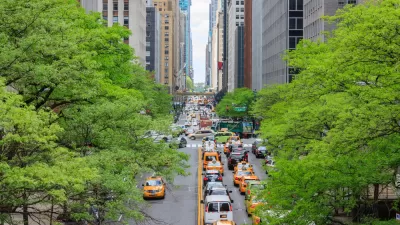The Association of Collegiate Schools of Planning (ACSP) and the Lincoln Institute of Land Policy recently recognized ten land use case studies for addressing some of the biggest challenges facing the world.

The ACSP and the Lincoln Institute of Land Policy have announced the winners of the 2020 Case Study Awards.
The Case Study Awards are designed to “address the rising social, economic, and environmental challenges facing cities across the globe, planners need foundational knowledge and skills as well as opportunities to apply them in real world situations,” according to the request for nominees announced by the organizations earlier this year.
The awards recognized case studies addressing six potential themes:
-
Low-carbon, Climate-Resilient Communities and Regions
-
Efficient and Equitable Tax Systems
-
Fiscally Healthy Communities and Regions
-
Functional Land Markets and Reduced Informality
-
Reduced Poverty and Spatial Inequality
-
Sustainable Land and Water Management
The ten winners, each awarded $2,000 each, are as follows:
-
Colleen Butcher-Gollach: University of Melbourne, Australia; Idyllic possible: planning for affordable and resilient settlements in the pacific island countries
-
Besmira Dyca and Kevin Muldoon-Smith: Northumbria University, UK; Progressive property tax on vacant land - dealing with land speculation in Sao Paulo
-
Minjee Kim: Florida State University; Opportunity for land value capture: land use impacts of the suncoast parkway extension project in citrus county, FL
-
Annette Kim and Andrew Eisenlohr: University of Southern California; The viability of community land trusts in high-priced urban land markets: the case of rolland curtis gardens in Los Angeles
-
Melina Matos, Sierra Woodruff, Malini Roy: Texas A&M University and Philip Gilberson, and Sara Merrow: Arizona State University; Comparing hazard mitigation and climate adaptation plans to understand in practice instruments that foster the creation of climate resilient community
-
Manuel Santana Palacios: University of California, Berkeley; Examining the Linkages Between Investing in Aerial Cable-Cars and the Evolution Informal Transport and Land Development: A Case Study of Ciudad Bolivar, Bogota
-
Emanuel Preciado: University of California, Irvine; Seeds of Resistance: Combating Spatial Inequality with Community Urban Gardens
-
Ross Rubenstein: Georgia State University; Should the Rochester Fast Ferry Sink or Swim?
-
Amruta Sakalker and Adrian Parr: University of Texas at Arlington; Trinity River Park Projects: Which project will be the long-desired bridge that connects the city of Dallas and the Trinity River
-
Henry Webber, Brian Phillips and Jodie Lloyd: Washington University in St. Louis; Forest Park Southeast: One neighborhood’s strategy to flight blight and disinvestment through a mixed income community development model
The Lincoln Institute of land Policy launched a digital library of case studies in 2017, which included 27 case studies before this recent round of awardees. The case studies are available to the public.
FULL STORY: Lincoln Institute Announces Case Study Award Winners

Alabama: Trump Terminates Settlements for Black Communities Harmed By Raw Sewage
Trump deemed the landmark civil rights agreement “illegal DEI and environmental justice policy.”

Study: Maui’s Plan to Convert Vacation Rentals to Long-Term Housing Could Cause Nearly $1 Billion Economic Loss
The plan would reduce visitor accommodation by 25% resulting in 1,900 jobs lost.

Why Should We Subsidize Public Transportation?
Many public transit agencies face financial stress due to rising costs, declining fare revenue, and declining subsidies. Transit advocates must provide a strong business case for increasing public transit funding.

Paris Bike Boom Leads to Steep Drop in Air Pollution
The French city’s air quality has improved dramatically in the past 20 years, coinciding with a growth in cycling.

Why Housing Costs More to Build in California Than in Texas
Hard costs like labor and materials combined with ‘soft’ costs such as permitting make building in the San Francisco Bay Area almost three times as costly as in Texas cities.

San Diego County Sees a Rise in Urban Coyotes
San Diego County experiences a rise in urban coyotes, as sightings become prevalent throughout its urban neighbourhoods and surrounding areas.
Urban Design for Planners 1: Software Tools
This six-course series explores essential urban design concepts using open source software and equips planners with the tools they need to participate fully in the urban design process.
Planning for Universal Design
Learn the tools for implementing Universal Design in planning regulations.
Smith Gee Studio
Alamo Area Metropolitan Planning Organization
City of Santa Clarita
Institute for Housing and Urban Development Studies (IHS)
City of Grandview
Harvard GSD Executive Education
Toledo-Lucas County Plan Commissions
Salt Lake City
NYU Wagner Graduate School of Public Service





























